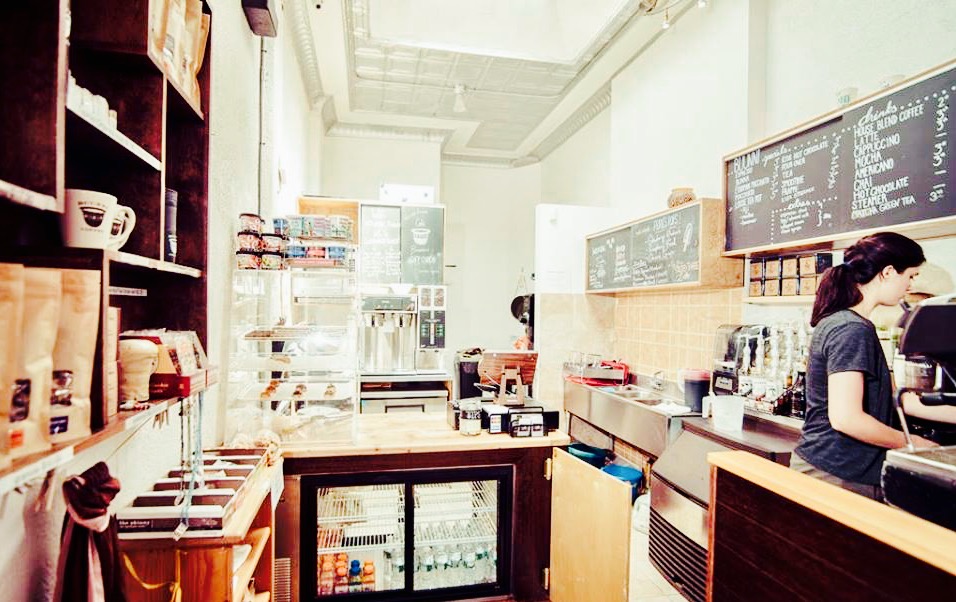For Elias, among the earliest memories of his Ethiopian childhood is being with the neighborhood children whose job was to call in all the locals for the daily coffee ceremony. In Ethiopia, the two hour ceremony isn’t just a time to drink coffee, but for people to catch up over not just one, but three distinct rounds of the brew. It was an important part of chatting, whether about the day’s news and politics or to share information—most importantly for Elias he knew the ceremony was the heart of building community in his town.
Today together with his wife Sarina, both big travelers, Elias Gurmu is the owner of Café Buunnii a shop featuring micro roasted Ethiopian coffee in NYC’s Washington Heights neighborhood. He is also getting ready to open Buunni’s second location in Riverdale. Drawing on his influences as a child, Elias took on his first job after high school as a barista, Sarina shared. She continued to say that today coffee is still a part of his daily life and an important way to highlight the positive aspects of Ethiopian culture beyond the focus of contemporary culture like famine or poverty or other topics that try to overshadow the country’s inner beauty.

Growing up in a heavy Southeast Asian tea culture in Nepal and south Asia, Sarina’s experiences in Ethiopia were her introduction to coffee’s place in daily life. Not only how much time goes into the farming—but its where she also developed an appreciation for its preparation.
“The name, Buunni, is based on the Amharic word for Buuna, which is the Ethiopian word for coffee and Buunni is both a playoff and representative of the brown color of the coffee bean,” said Sarina. Connecting both the country and the authentic coffee culture of Ethiopia was important in the concept for the shop.
Two very Ethiopian beverages can be found on the menu at Café Buunni, including the Buuna, which is served in a little glass exactly as you’d find in a café in Ethiopia. Second, the Makiyato, or Macchiato as its commonly known, is also served in glass after being layered beautifully with milk, although familiar its portion is smaller than what you may be used to in the U.S.

Both coffee beverages are very pervasive in Ethiopia, especially in rural areas—in fact, for the shop it’s often that patrons will stop in for a makiyato and say, ‘This is just how I remember,’ or they’ll have the Buuna and comment on how they haven’t had it in years, Sarina described the conversations. “It can quickly transport you to a place, and for people who haven’t been to Ethiopia those two drinks can really bring it home.”
The shop uses the Ethiopian Arabica bean, including the Sidamo, Yirgacheffe, and Harrar coffee beans which come directly from Ethiopia. Coffee first originated in the country, which features locally differentiated types of beans with unique flavor profiles depending on the soil and altitude. Sarina explained to us that the varietals are from different regions and the names of the coffees are named for the places they originate from.

“It’s specialty coffee and very much rooted in the culture of the country. In many places, there’s large scale farming, but a lot of people have coffee growing in their backyards and drink and share it as a family, so it’s very much a local tradition.” In a global city like New York the universal concept of the culture can be easily understood.
One thing you won’t find at Café Buunni is rush hour. “The experience [at Buunni] is not a fast, quick jolt to get you started; it’s slow coffee,” Sarina laughed. While it’s not to-go coffee New Yorkers expect in their jaunt through the work day, the coffee shop does strike a balance between a true Ethiopian coffee experience and the New York City lifestyle. “We really try to stress the aspect of community, and coffee being a vehicle for getting the community together—for quality time with friends and family.”

“The café doesn’t try to overtly be Ethiopian, but there are elements we use [like] the traditional Ethiopian coffee pot, the art, and the sound of the machines we use. It’s a blend—it’s an Ethiopian experience in a way that’s translated to this context [of New York City].” Buunni Coffee is very much a NYC café, but it’s infused with the values of what Ethiopian culture brings to the city.
In a sense, the shop sort of serves like a bridge to a broader sense of the city’s local culture—rather than walking in and saying it looks like Ethiopia, patrons walk into something familiar that they know, like familiar décor and baked goods, and then take a step further to meet something new that they didn’t know.

The café hosts both people who come in to take coffee to-go, but the defining feeling of the space is for those patrons who like to linger, to sit, to sip and to chat. The couple’s value for a sense of community is also a part of the reason they deliberately source and support local businesses in their shop—from displaying handmade scarves from a women’s co-op in Ethiopia’s capital and largest city Addis Ababa, to a rotation of local art including Ethiopian artists, and even the chocolate they get from a local supplier to use in their coffee drinks.

While ceremonies for groups aren’t possible in the shop due to its size, the couple does perform coffee ceremonies by request at offices or in people’s homes—a way to share the experience with others. But that doesn’t diminish the defining qualities of the coffee shop, especially for Elias whose personal story and shop embodies the cultural aspects and hospitality of how the coffee is traditionally served.
“He’s very much a part of the [Ethiopian] story, and people like to talk to him about the coffee and the coffee culture, for recommendations and to try something new,” Sarina told us about her husband. “He very much enjoys that and making drinks for people.”
Attention to people is at the center of their operation at Buunni, especially the people in the process of getting coffee-to-cup. The couple pays close attention to the fact that coffee farmers in Ethiopia run small farms and there are a lot of people involved in growing the coffee. “There is a lot of respect for the people who are growing this very special coffee,” Sarina explained.

“All of the passion that goes into the coffee—it’s essentially one coffee cherry that’s picked at a time, and that takes passion, time, love, and expertise.” The couple tries to always, even when training their staff, be extremely mindful that coffee is not just the commodity contemporary culture makes it out to be.
“A lot of people will comment that there is a self-respect and pride in Ethiopia—in the culture, the history, and the quality of things like the coffee. But it’s not an arrogant pride, but rather the satisfaction of being proud of something that you’ve cultivated to able to share.” In other words, it’s that kind of pride that communicates the value of Ethiopian coffee culture, and not for the farmers themselves but rather so that they can pass it down to others. It’s about community.
For more information on Café Buunni, visit www.buunnicoffee.com.




